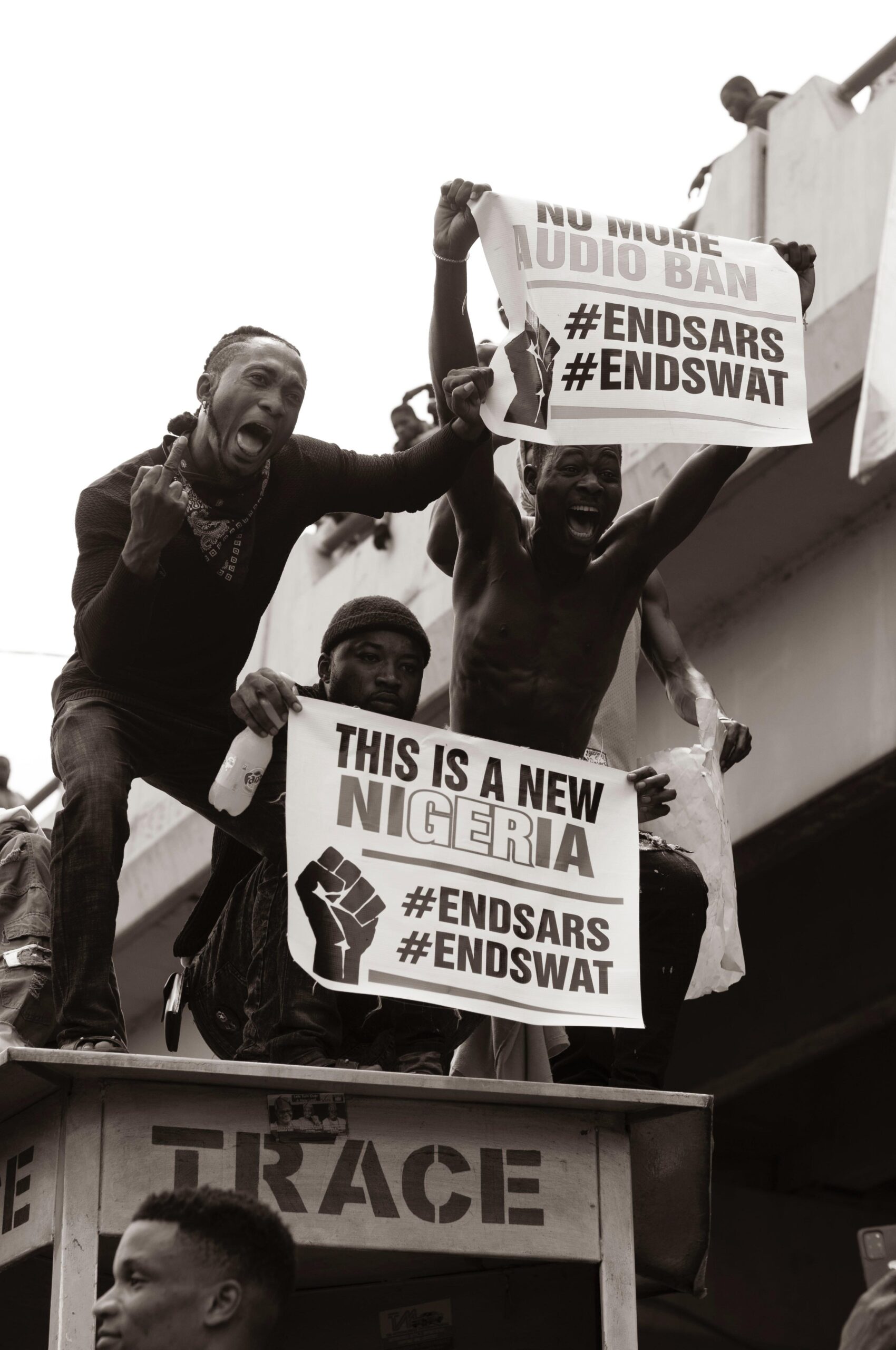
Young Nigerians protest police brutality at a #EndSARS protest ground in Lagos
Photo by Tope. A Asokere on Unsplash
Music played a huge role during the #EndSARS protests of October 2020 in Nigeria. Across protest grounds, music boosted the morale of the crowds, inspiring the masses to demand changes in Nigerian policing.
A video posted on Twitter of a man, later identified as Joshua Ambrose, being thrown out of a moving vehicle by SARS (or Special Anti-Robbery Squad, a unit of the Nigerian police force) officers in Ughelli, a rural town in southern Nigeria, prompted the protests after it went viral.The now-defunct SARS — created to combat the widespread robbery and kidnappings of the 80s — had become notorious for harassing, brutalizing, and extorting young Nigerians for their appearance or for the gadgets they carried, sometimes even profiling them as internet fraudsters.
Musicians were at the forefront of the movement from the start. Musicians Falz and Runtown led the first protests in Lagos, and in the southeastern part of the country, highlife musicians Phyno and Flavour organized mass protests in different cities. However, not much music from these pop icons was played at protest locations, as their music did not exactly match the mood of the protests.
Instead, to set the tone for the uprising, DJs scratched back decades in time for music that could suit the moment, ultimately finding solace and power in the discographies of older musicians such as Fela.
Fela isn’t just famous today for pioneering the Afrobeat genre that has influenced music across Africa and beyond; he’s also beloved because of the way his music has always intertwined with his activism. Tracks like “Zombie,” “Authority Stealing,” and “Coffin for Head of State” rallied against the ineptitude and corruption of the Nigerian government of his time.
Fela Kuti – Zombie (Edit) (Official Audio)www.youtube.com
It is sad that decades later, Nigerians still find those songs reflective of their present and are still plagued with similar concerns — which include, police brutality, corrupt government, unemployment, oppressive leadership. “Zombie,” which was released in 1976 during the oppressive military regime of General Murtala Mohammed, compared the Nigerian soldiers to zombies who follow orders mindlessly, even when it means committing crimes against humanity. The same can be said today of the Nigerian police and armed forces.
In 1983, Muhammadu Buhari, Nigeria’s then head of state, had Fela arrested and sentenced to jail over trumped-up charges of money laundering due to Fela’s criticism of his government. It’s been more than 30 years since then, and Nigeria operates a civilian government today, but Buhari — who returned as the country’s president in 2015 — isn’t reformed: instead, he’s ruling the country with as much despotism as he did in his previous government.
#EndSARS may have been a call to end police brutality and for the disbandment of a rogue police unit, but it soon became a demand for better governance, with citizens stating clearly their demands in 5 points. And soon, songs like African China’s Mr. President, released more than a decade ago, found their way on protest playlists. The song’s chorus sings:
Mr president
Lead us well
If you be governor
Govern us well
If you be senator
Senate am well
If you be police
Police well well, no dey take bribe
No matter how far back the DJs reached, contemporary music still broke through. While musicians like Burna Boy and Falz may have a few songs that decry the country’s poor condition, it was Davido’s Fem — a song widely understood to be a diss track at a rival musician — that became the protest movement’s true anthem.
Among the protestors, the song was infectious. The lyric I dey live my life, man dey turn am to shoot on sight came to embody the people’s frustrations with the police, and their calls for the right to exist without fear of a gun being pointed at you.
Davido – FEM (Official Video)www.youtube.com
Nigerian pop music has been the subject of a lot of criticism for not being socially conscious. But the events of #EndSARS and the night of the massacre at Lekki were too horrific for musicians to simply ignore.
Just like the Nigerian populace, Nigerian music experienced an awakening during the many days that stretched into weeks of protests all over cities and towns in Nigeria during the #EndSARS protests. A good number of musicians from established acts like Burna Boy to budding artists like Chike felt not only the duty to document the events but also to protest the carnage the government had sponsored.
Here are some of the new songs that #EndSARS inspired.
Banky W’s “Talk and Do”
Banky W – “Talk and Do” feat. 2Baba, Timi Dakolo, Waje, Seun Kuti, Brookstone & LCGC (LYRIC VIDEO)www.youtube.com
Banky W collaborates with other Nigerian musicians Timi Dakolo, Waje Kuti, Seun Kuti, Brookstone, and LGC on this track. “Talk and Do” is instructive; it calls Nigerians to action. Here, Banky W and the ensemble assert that simply talking about the problems of Nigeria isn’t enough to create change. The song emphasizes the importance of social activism, encouraging all to be part of the change they would like to see.
But the song also comes off a tad insensitive, considering it was released just six days after the Lekki Massacre. On the night of October 20, 2020, unarmed #EndSARS protesters gathered in Lekki, an upscale suburb in Lagos, were shot at by soldiers of the Nigerian Army. Amnesty International reports that at least,12 people were killed that night. The Lekki Massacre brought the protests to an abrupt halt. Banky W’s charging message of spurring social activism in Nigerians, however well-intentioned, was coming at the wrong time.
Falana’s “Teletele”
Falana – Teletele (Lyric Video)www.youtube.com
Five days after the shooting of unarmed protesters at Lekki, Falana uploaded a video to her Instagram, where she poured out her heart on the pains of the event with music. My heart is bleeding, what’s the remedy, she cried out. As she detailed in an Instagram post later announcing the song’s release, “Teletele” was her way of processing the shock and anguish she felt on the night of the massacre, proclaiming that producing the #EndSARS-inspired song was in line with her fundamental duty as an artist — to reflect the times.
Chike’s “20-10-20 (Wahala Dey)”
Chiké – 20.10.20 (Wahala Dey) [Viral Video]youtu.be
Chike’s record begins with a recording of Nigerian politician and legislator Desmond Elliot at a Lagos State Assembly meeting campaigning for a clampdown on social media use in Nigeria because of the harsh government criticism being perpetuated there. The video had gone viral on Twitter and had sparked outrage, as it was released a few days after the massacre, and Nigerians saw the move to crack down on social media as an attempt to stifle free speech.
Throughout Chike’s record, he criticizes and expresses frustration with government policies and the oppression of its citizens that culminated on the night of the massacre. Chike’s record asks the all too important questions plaguing Nigerians since that fateful night: Who give the order to shoot us all? Who give the order to kill us all?
Despite live video footage evidence from that night, the Nigerian government continues to deny the massacre.
Burna Boy’s “20 10 20”
Burna Boy – 20 10 20 (Audio)www.youtube.com
While Chike asks questions, Burna’s record is a lot bolder. He overtly accuses the government and the police of the atrocities of the night, naming and shaming everyone involved or who looked away including the president, his chief of staff, the governor of Lagos, the commandant, and the soldiers who shot at protesters that night. The song ends with a provocative tape from the night of the massacre. While soldiers fired ammunition, a protester, probably waving the Nigerian flag, can be heard in the background telling other protesters to sit calmly. It is heartbreaking.
Femi and Made Kuti’s Legend
Legacy +
In February 2021, Femi and Made Kuti, son and grandson of Fela, released a joint album called Legacy. Both albums, Femi’s Stop the Hate and Mades’s For(e)ward, continue the Kuti legacy of using music to share critical messages and demand social change.
It would be disingenuous to assert that #EndSARS inspired the album because work on it began months before the protest started, but the album couldn’t have come at a better time. It addresses police brutality, social inequality, and corruption in government—all concerns of #EndSARS.
No matter that the #EndSARS protests had ended on a bleak note; the protest music it inspired can be considered an upside of the movement on the whole. Like many movements fueled by music before it, #EndSARS proved that music isn’t only a tool for entertainment. It can genuinely inspire social change, working as an important tool for activism and dissent across the globe.














